How AI generated NFT Arts is Shaping the Future of NFT Art Collections
May 29,2025
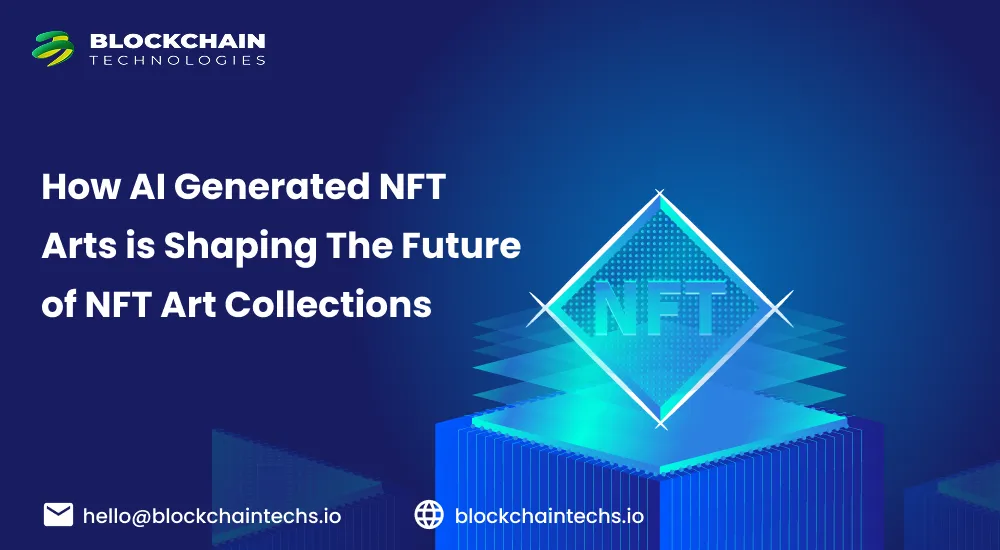
The art world is constantly evolving, and the emergence of Non-Fungible Tokens (NFTs) has ushered in a digital renaissance, creating new avenues for artists and collectors alike. This fusion of artificial intelligence and blockchain is redefining ownership, value, and accessibility in the digital art world.
- The global NFT market, valued at $21.3 billion in 2023 (Grand View Research), is on a meteoric rise, projected to hit a jaw-dropping $231.1 billion by 2030, growing at an explosive 34.2% CAGR.
- The market for AI-generated NFTs is experiencing significant growth. For instance, the global generative AI in art market is projected to reach $2.51 billion by 2029, growing at a compound annual growth rate (CAGR) of 42%, according to a report by The Business Research Company.
- A landmark moment came with Sotheby’s 2024 auction of “The Infinite Machine”, a Generative AI art NFT series that sold for $1.2 million, solidifying AI’s place in the high-stakes world of fine digital art.
- On platforms like SuperRare, 65% of emerging artists are now using tools like DALL·E 3 and MidJourney to create AI-powered collections, marking a paradigm shift in the creative process.
Let’s dive deeper into the platforms, investment trends, and revolutionary tools driving the next wave of the AI NFT art movement. In this blog, we’ll explore:
- The fascinating world of AI NFTs and how they're transforming the digital art ecosystem
- The role of AI in NFT marketplaces and how smart algorithms influence buying, selling, and showcasing art
- How AI-generated NFT art is shaping the future of NFT art collections through automation and creativity
- The top AI NFT art platforms in 2025 making waves in the crypto-art world
What are AI NFTs?
In 2025, AI NFT art collections are not just visually stunning, they also push the boundaries of creativity, merging machine intelligence with human imagination.
AI-generated NFTs are unique digital artworks created using generative adversarial networks (GANs), neural networks, or text-to-image models like MidJourney, DALL·E 3, and Stable Diffusion.
- These models are trained on millions of images to generate original artworks.
- Artists or users input prompts or styles, and the AI produces a one-of-a-kind piece.
- Once created, the art is minted on the blockchain as an NFT, ensuring verifiability and scarcity.
The Role of AI in NFT Marketplaces
AI NFT marketplaces are more than just selling platforms, they’re intelligent ecosystems revolutionizing how artists mint, price, discover, and trade NFTs.
Thanks to AI-generated NFT art, marketplace algorithms now go far beyond search and recommendation. They shape user experience, value prediction, fraud detection, and even curation of entire galleries.
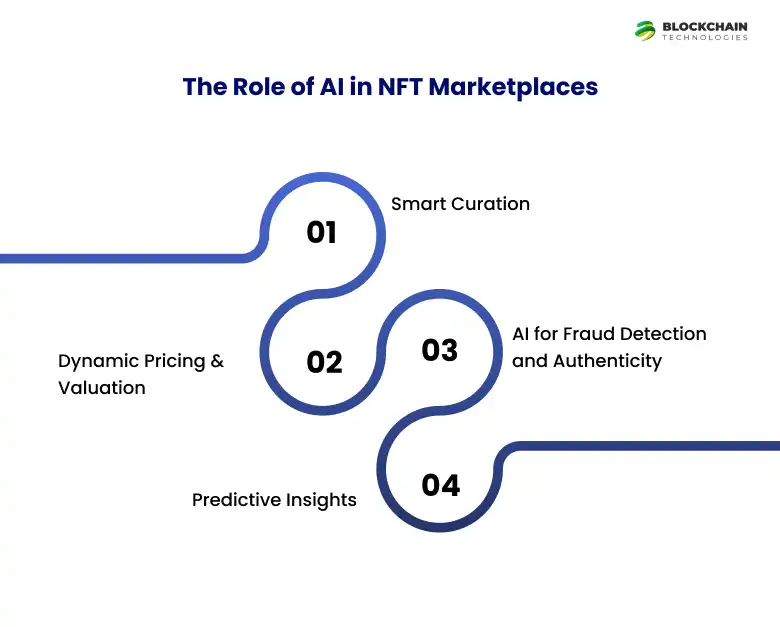
Let’s explore how AI in NFT marketplaces is transforming the landscape:
Smart Curation
One of the most exciting roles of AI in NFT platforms is automated curation. Instead of relying solely on human input, AI models help marketplaces:
- Curate collections based on user preferences, trending aesthetics, and historical patterns.
- Showcase AI NFT art collections with higher engagement potential.
- Personalize discovery feeds for buyers using machine learning algorithms and neural filters.
Dynamic Pricing & Valuation
Understanding how to price a piece of digital art can be complex. That’s where AI NFT art valuation methods come into play.
- AI models analyze historical data, rarity, social trends, and creator reputation to predict pricing.
- Some marketplaces use AI-powered tools to provide price estimations and alerts to sellers and buyers.
- This helps reduce undervaluing or overpricing NFTs, especially for AI-generated NFT art investment opportunities.
AI for Fraud Detection and Authenticity
Fake NFTs and art plagiarism are serious problems in the NFT world. AI offers advanced fraud detection in:
- Identifying duplicate or stolen artworks by scanning visual and metadata fingerprints.
- Using image recognition and blockchain analysis to verify AI-generated NFT art authenticity.
- Flagging suspicious transactions using predictive algorithms.
Predictive Insights
AI NFT art tools embedded in marketplaces now offer predictive analytics to help users make smarter buying decisions:
- Market trend predictions based on token behavior and sales velocity.
- Insights into which AI NFT artists or collections are gaining traction.
- Visualization of expected value trajectory using real-time data.
How AI-Generated NFT Art Compares to Traditional Art Markets
While traditional art markets rely heavily on galleries, human curation, and physical ownership, the rise of AI-generated NFT art introduces decentralized, dynamic, and algorithm-powered ecosystems for creators and collectors alike.
Here’s a quick comparison of NFTs and traditional art markets:
| Feature | Traditional Art Market | AI-Generated NFT Art Market |
|---|---|---|
| Creation Method | Manual, human artists | AI-driven tools like DALLE, MidJourney, Artbreeder |
| Ownership | Physical certificates or gallery ownership | Blockchain-based smart contracts |
| Authentication | Paper-based, expert evaluation | Immutable blockchain and AI fraud detection |
| Valuation | Market demand and critic opinion | Real-time data, AI NFT art valuation methods |
| Accessibility | Limited to galleries and elite buyers | Global via AI NFT marketplaces |
| Curation | Curators and art experts | AI-powered algorithms, personalized recommendations |
| Interactivity & Programmability | Static physical formats | Dynamic, programmable, generative elements |
| Liquidity | Low (long resale cycles) | High with 24/7 secondary markets |
| Artist Visibility | Limited exposure | Global reach via AI NFT art platforms |
| Scalability | Time-intensive and resource-heavy | Scalable through automation and generative AI |
How to Create AI-Generated NFT Art: Tools & Steps
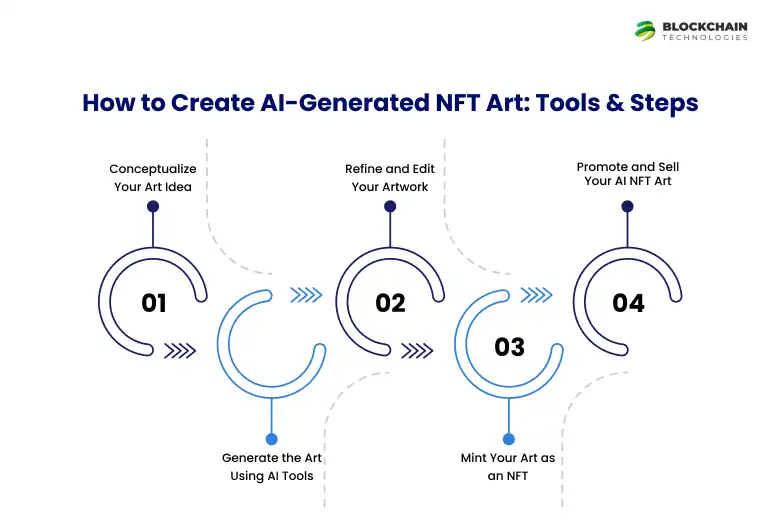
Step 1: Conceptualize Your Art Idea
Start with an idea or theme for your NFT art. Think about styles, emotions, or messages you want to convey. You can sketch rough ideas or write descriptive prompts if you’re using text-to-image AI like DALL·E 2.
Step 2: Generate the Art Using AI Tools
Choose your preferred AI tool. For beginners, platforms like Artbreeder or DeepDream Generator offer intuitive interfaces. For advanced users, consider coding your own AI model using TensorFlow or PyTorch.
Step 3: Refine and Edit Your Artwork
Once generated, you might want to enhance or tweak your art. Use graphic editors like Adobe Photoshop or GIMP for color adjustments, layering, or adding finishing touches.
Step 4: Mint Your Art as an NFT
Minting means registering your digital art on a blockchain to create a Non-Fungible Token. Here’s how:
- Choose an NFT marketplace like OpenSea, Rarible, or Foundation.
- Connect your crypto wallet (MetaMask is popular).
- Upload your artwork file.
- Add metadata like title, description, and properties.
- Pay the gas fee (transaction fee on Ethereum or other blockchains).
- Confirm minting, and your NFT is live!
Step 5: Promote and Sell Your AI NFT Art
Share your NFT art on social media, art communities, and NFT forums. Building a personal brand and engaging with collectors can increase visibility and value.
Launch Your Own NFT Art Collection Today!
Step into the future of digital creativity with the power of artificial intelligence.
How the Integration of AI in NFT Platforms is Transforming Digital Art Creation
The integration of AI in NFT platforms is transforming how digital artworks are created, minted, priced, and sold. Whether you’re an artist, collector, or investor, AI-powered tools are streamlining and enhancing every stage of the NFT lifecycle.
Let’s break down the key ways this transformation is happening:
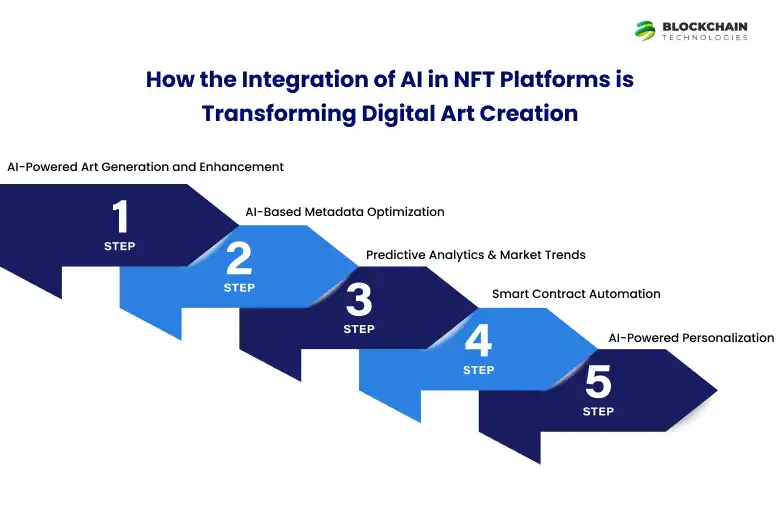
AI-Powered Art Generation and Enhancement
Modern AI NFT art tools like DALL·E 3, MidJourney, and Runway ML enable artists to generate stunning visuals through text prompts, drastically reducing the time and skill required to create high-quality artwork. These tools use Generative AI art NFTs models trained on billions of images.
AI-Based Metadata Optimization
Beyond visual creation, AI NFT platforms also use machine learning to generate metadata that optimizes discoverability and resale potential.
- AI analyzes traits like color, composition, rarity, and themes.
- Metadata boosts visibility in AI NFT marketplaces by helping collectors search with precision.
- Platforms like OpenSea and LooksRare are integrating AI plugins for better tagging and categorization.
Predictive Analytics & Market Trends
AI excels at recognizing patterns in user behavior, pricing trends, and demand spikes. This enables:
- AI NFT art investment strategies powered by real-time predictive models.
- AI dashboards that forecast potential value spikes based on social sentiment, AI NFT art trendsAI-generated NFT art market trends, and historical data.
- Platforms like NFTGo and NonFungible.com now offer AI-generated analytics for traders.
Smart Contract Automation
Algorithms help determine royalty structures, resale conditions, and trigger-based interactions. Platforms like Rarible and Foundation have introduced AI-enhanced minting tools with automated compliance features.
AI-Powered Personalization
AI NFT marketplaces use recommender systems that show buyers collections tailored to their taste. Some platforms now feature “AI-curated NFT galleries” for a better user experience and engagement.
How AI-Generated NFT Art is Shaping the Future of NFT Art Collections
The convergence of AI-generated NFT art and blockchain technology has opened new frontiers in the digital art world. With platforms increasingly embracing AI NFT art tools, collectors, artists, and investors alike are witnessing a fundamental shift in how art is created, valued, and traded.
Let’s explore how this shift is shaping the future of AI NFT art collections and where Generative AI art NFTs are headed.
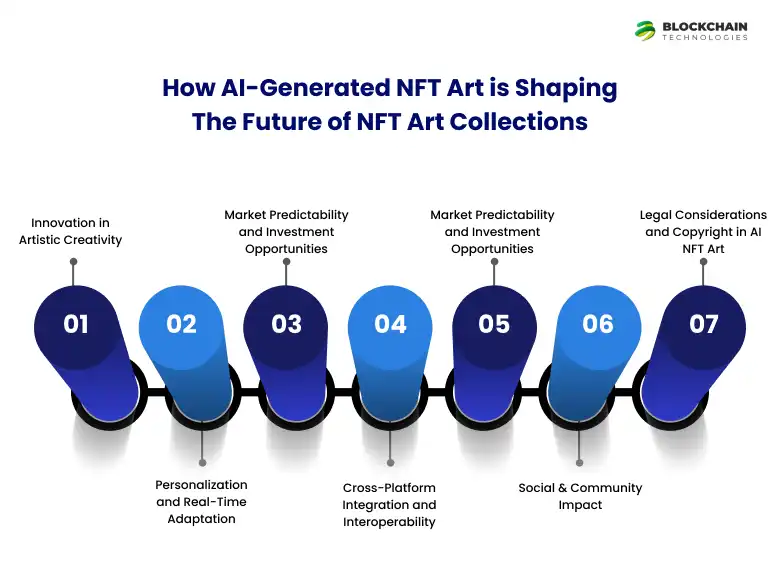
Innovation in Artistic Creativity
Modern AI NFT artists are no longer just coders, they are creators trained in design, storytelling, and neural networks. These artists use tools like DALL·E 3, RunwayML, and MidJourney to create surreal, hyper-realistic, or entirely novel pieces of AI art NFTs.
- Generative AI art NFTs allow for endless creativity by enabling machines to learn from historical artworks, style patterns, and user prompts.
- With style-transfer algorithms and GANs (Generative Adversarial Networks), machines can replicate Picasso, Van Gogh, or even develop entirely new artistic identities.
Personalization and Real-Time Adaptation
Unlike traditional art, AI-generated NFT art can adapt based on collector behavior or user interaction. For example, an artwork might change colors depending on the holder’s geographical location or real-time weather using AI rules.
- Through reinforcement learning and buyer preference modeling, platforms can recommend and auto-generate NFTs tailored to individual tastes.
- This is redefining the collector experience and driving new levels of engagement in AI NFT marketplaces.
Market Predictability and Investment Opportunities
The use of AI NFT art valuation methods has revolutionized how digital art is priced and forecasted. Platforms integrate machine learning models to assess rarity, visual complexity, artist performance, and social engagement, making AI NFT art investment more data-driven.
- Predictive analytics helps investors identify micro-trends before they go mainstream.
- Automated trading bots are now appearing on AI NFT marketplaces, buying and selling based on valuation trends and predictive modeling.
Cross-Platform Integration and Interoperability
Leading AI NFT art platforms in 2025 like Async Art, Art Blocks, and SuperRare now support advanced API integrations, enabling cross-chain AI NFT art tools to function seamlessly.
- NFTs can now be minted, traded, and displayed across different blockchains like Ethereum, Solana, and Tezosthanks to AI-integrated bridges and metadata standardization.
- AI is used to verify authenticity, detect plagiarized content, and ensure smart contract security.
Redefining the Meaning of “Collection”
The very nature of what constitutes an art collection is being transformed by AI-generated NFT art. Instead of static portfolios, collections can now evolve over time, respond to market signals, or even change aesthetically based on AI logic.
- Owners can collaborate with AI engines to co-create, update, or “evolve” their NFTs into newer forms, giving rise to the concept of “living collections.”
- This dynamic capability is redefining both art ownership and curation.
Social & Community Impact
- These tools lower the entry barrier and make selling AI-generated NFT art online accessible to everyone, from startup designers to community-led art projects.
Legal Considerations and Copyright in AI NFT Art
As AI NFT art expands, concerns around originality, copyright, and authorship also grow. Who owns an AI-generated image: the coder, the artist, or the algorithm?
- Platforms are beginning to introduce transparent legal considerations for AI-generated NFTs, including watermarking, proof-of-creation protocols, and ethical creation standards.
Benefits of Integrating NFTs and AI in the Digital Arts Industry
The fusion of NFTs and Artificial Intelligence (AI) is reshaping the creative landscape in ways we never imagined. From how art is produced to how it’s distributed, collected, and experienced, AI-generated NFT art is disrupting the traditional norms of the art world. Let’s break down the benefits of NFTs and AI in the arts, with a look into how key innovations are impacting creators, collectors, and investors.
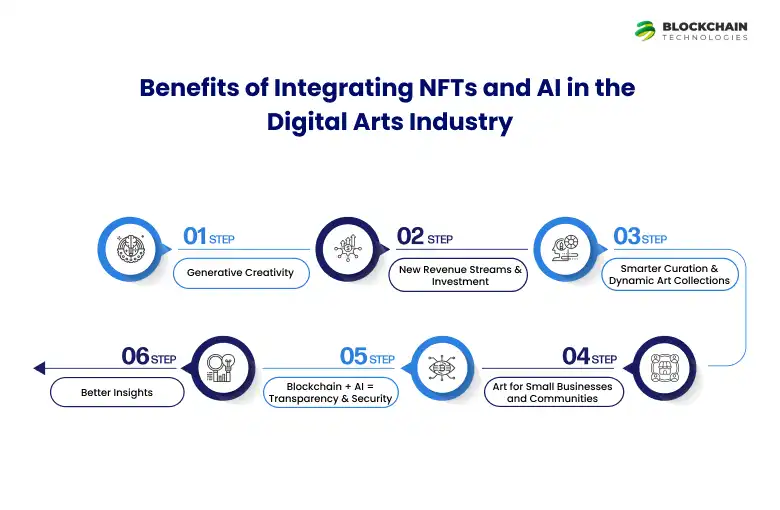
Generative Creativity
Generative AI art NFTs enable creators to turn ideas into visuals with zero code or traditional design skills. Tools like DALL·E and MidJourney are helping AI NFT artists redefine creativity
New Revenue Streams & Investment
Artists can now sell AI-generated NFT art online through AI NFT marketplaces, expanding their global reach. Plus, investors are eyeing AI-generated NFT art investment opportunities for high ROI.
Smarter Curation & Dynamic Art Collections
AI enables dynamic, evolving NFT art that changes based on data or engagement. This gives AI NFT art collections a living, interactive quality rarely seen in static art forms.
Art for Small Businesses and Communities
AI NFT Art for Small Businesses: Affordable Creativity at Scale lets even local creators generate and mint high-value artwork. This levels the playing field and opens new streams of income.
Blockchain + AI = Transparency & Security
AI NFT art tools improve fraud detection and automate copyright verification. Together with blockchain, they ensure ownership authenticity and secure transactions.
Better Insights
With AI-generated NFT art market trends, creators can tailor their work to what collectors want. AI analytics help investors track performance, rarity, and pricing.
Your NFT Journey Starts with a Single Click!
Explore platforms that turn text, sketches, or photos into tokenized artwork.
Technology Behind AI-Generated NFT Art Platforms
The fusion of AI and blockchain is the result of powerful technologies working together to create, mint, and market AI-generated NFT art. Let’s explore the backbone tech that’s powering AI NFT art platforms in 2025 and beyond.
Generative Adversarial Networks (GANs)
At the heart of AI NFT art creation are GANs, two neural networks (generator and discriminator) that work together to produce original artworks. These networks are trained on massive datasets of images and fine-tuned for style, texture, and uniqueness, making them ideal for generating Generative AI art NFTs.
Machine Learning Algorithms
Through continuous learning, machine learning models analyze art trends, color palettes, and collector behavior. This allows AI NFT artists to generate artwork that aligns with current AI NFT art market trends and improve their success rate on AI NFT marketplaces.
Blockchain Technology and Smart Contracts
Smart contracts, deployed on Ethereum or other blockchains, record the creation and sale of AI art NFTs, ensuring immutable proof of ownership, transparent royalty distribution, and resale tracking. This makes the AI NFT art investment process trustworthy and decentralized.
NLP and Text-to-Image Tools
Platforms like DALL·E, MidJourney, and Stable Diffusion use Natural Language Processing (NLP) to convert text prompts into high-fidelity visuals. This enables creators to produce AI-generated NFT art from simple ideas, speeding up workflow and scaling content production.
API Integrations and Cloud Infrastructure
To handle real-time rendering, minting, and trading, modern AI NFT art platforms rely on scalable cloud services and robust APIs. These support seamless integration with AI NFT marketplaces, wallets, and portfolio tools, making it easier to sell AI-generated NFT art online.
Wrapping up:
The convergence of AI and NFTs is a technological renaissance that’s transforming how art is created, collected, and valued. From AI-generated NFT art and Generative AI art NFTs to personalized creation tools and intelligent marketplaces, the NFT space is evolving into a dynamic ecosystem fueled by innovation. For artists, collectors, investors, and even small businesses, this evolution opens the door to endless creative and economic opportunities. As this digital revolution accelerates, now is the perfect time to invest in NFT development and embrace the future of intelligent digital art.
Got an Idea? Make it Art. Make it an NFT.
AI art tools bring your concepts to life and help you monetize them.
FAQs:
Top tools like DALL·E 3, MidJourney, and Runway ML offer powerful features to help artists create stunning AI-generated NFT art with ease, automation, and style.
Small businesses can diversify revenue by investing in AI NFT art collections, leveraging accessible platforms and growing trends in the AI NFT art marketplace.
The cost typically ranges from $50,000 to $150,000, depending on features like AI-powered smart contracts, risk models, and cross-chain support.
Platforms like OpenSea, SuperRare, and Art Blocks are leading the way in hosting AI NFT artists and showcasing the latest in AI NFT art tools and trends.
By integrating advanced blockchain technologies, top blockchain development services ensure secure, transparent, and scalable platforms for creating, storing, and trading Generative AI art NFTs.
